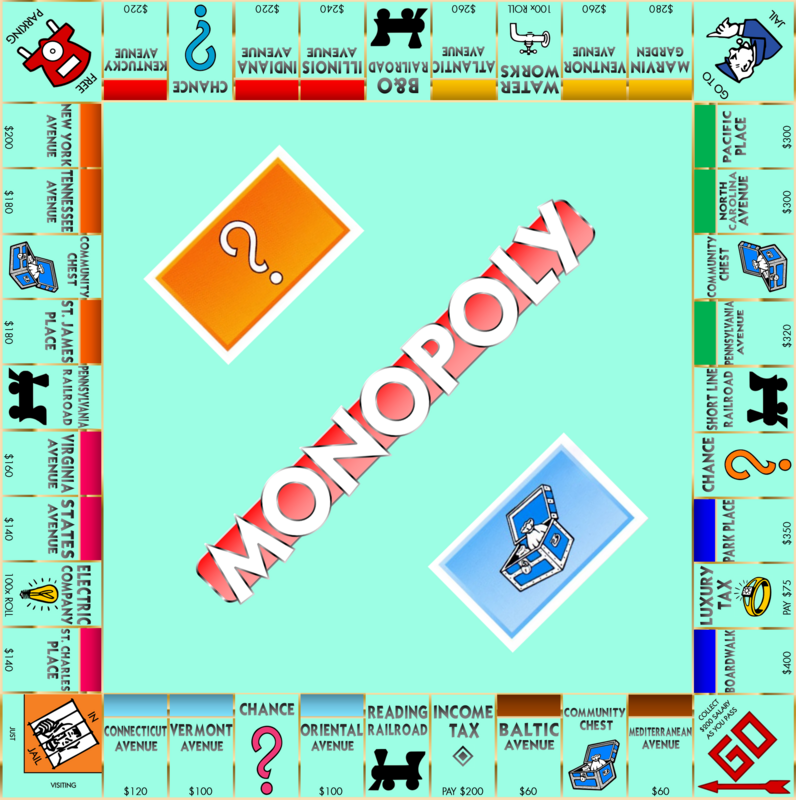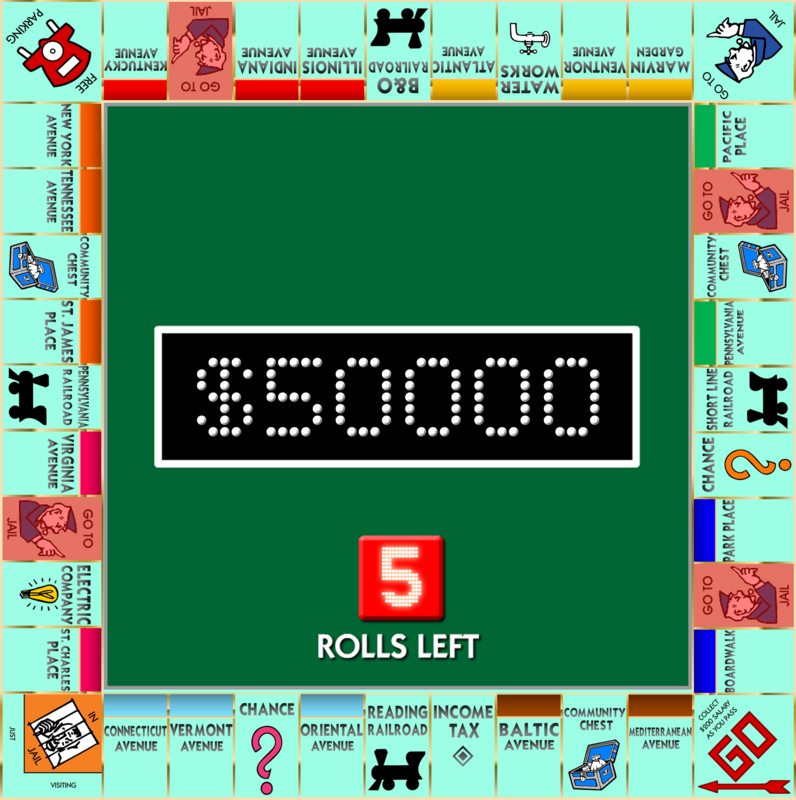Post by tmann3x on Apr 7, 2023 14:06:55 GMT -5

The May premiere of MONOPOLY is just weeks away. However, our global moderator Doug Morris and our pal and creative consultants Steve Anderson, David Hammond and I had made some rules to this upcoming net game show.

Round 1 - ACQUISITION
Three contestants, playing as red, gold, and green, competed to win monopolies on the Monopoly board. Starting from "Go" and moving clockwise one property at a time, each colored property went up for grabs. To win the property and its price (as money), a player had to answer a question ala "Blockbusters". Wrong answers deducted the property's price from the player's score. If no one answered a clue correctly, another question with another clue would be asked for the property, but the money that could be gained or lost on that question/clue was halved.
Each time the last property of a colored group was taken, control of the monopoly would then be up for grabs. If one contestant earned all the properties in a group, then that contestant earned the monopoly. However, since split/divided-ownerships were never allowed unlike the normal game, if two players had properties in the group, a series of showdown questions between those two came into effect. Each of the two contestants needed as many right answers as opposing properties in the group. No money changed hands on these clues. If a contestant answered a showdown question incorrectly, the opponent automatically received credit for a correct answer. If all three players had one property each, the host would give a toss-up question to all three. The player with the right answer would get to take one property (and thus, decided whom to play against (should anyone miss, that contestant was disqualified and lost his/her property)). The two contestants with properties then had a separate showdown as above. After all this, whoever ended up with the monopoly earned the combined price of all the properties in that group.
After claiming all the monopolies, the contestants (during a commercial break) then decided how to build houses and hotels on properties, using the cash won by answering questions/clues and making monopolies. Houses cost $50 each, and hotels cost $250, and, as per the board game rules, properties had to be developed evenly (i.e. you can't have two houses on any one property unless each property has at least one).

Round 2 - BIG MONEY ROUND / LANDLORD
After all development had finished, the three contestants would then have a chance to earn money as a flashing neon cursor moved around the board via the roll of the dice. The hostess rolled the dice, moving the cursor the corresponding number of spaces.
Depending on where the cursor landed, various outcomes were possible. They were:
Regular Properties – Host read a question to the player who owned the property. A correct answer to the question earned the rent (there was no penalty for a wrong answer). If the owner's response was not correct, the other two players could buzz in for a chance to earn the rent (risking losing money for a wrong answer).
Chance & Community Chest – Like the normal game, a card was drawn (a computer effect of the card appeared to the home viewers) and it either effected the player(s) score(s) or took the neon cursor to anywhere on the board. Some of the cards were from the actual board game, while the rest were created exclusive to the game show.
Utilities – Host read a toss-up question to all three players. The first one to buzz in with a correct answer won $100 times the total number last rolled (example: the dice had a 5 rolled so $100 x 5 is $500)
Railroads – When any one of these railroad spaces was landed on, it opened the door to a "Hostile Takeover" situation. Host read a question to all three players. The first one to buzz in with the correct answer could move the cursor to the first property of any opponent's monopoly. The player then had to answer one question unopposed for each property in the monopoly, a correct answer advancing the cursor to the next property. Completing the contract stole the monopoly from that opponent. If a player failed to answer a clue, then they were penalized the rent for the property on which the cursor was, and the owner of the property received that rent.
Free Parking – Host read a question to all three players. The one with the correct answer won a jackpot which started at $500 plus money paid up by the contestant(s) in terms of taxes, fines and things.
Go to Jail – When that space was landed on, all three players were each fined $250.
GO – Landing on or passing Go added $200 to all three contestants' totals.
Taxes – Luxury Tax cost all players $75 each, while Income Tax charged each of them $200 of their cash total.
After all the 20 questions have been expired, all the contestants sold back houses and hotels (for face value) on monopolies they now owned. The one with the highest cash total win the money, the game, and the right to play the bonus round.

ONCE AROUND THE BOARD BONUS GAME
The champion then had a chance to win $25,000 or $50,000 by completing one trip around the board. Before starting the round, they selected one space on the second row, one space on the third row, and two spaces on the fourth row to be "Go to Jail" spaces (along with the one in the corner). The spaces that became "Go to Jail" spaces plus the one in the corner all turned red. The champion then had up to five rolls of the dice to move the cursor, starting from "Go," once around the board without landing on any "Go to Jail" space. Rolling doubles gave them an extra roll. Each space traversed earned the champion $250. They could stop and take the winnings after any successful roll, as landing on "Go to Jail" or falling short of "Go" after the allotted rolls lost the bonus money. However, passing "Go" earned $25,000, and landing on "Go" exactly earned $100,000. On the champion's fifth and final day, the payoff in this bonus round is $250,000 for passing GO! and if the champion lands on GO!, the champ will take home $1 million!
I hope all of you guys understand the rules. And if you have any further questions and/or input, please let us know. Thank you for your patience and understanding.


